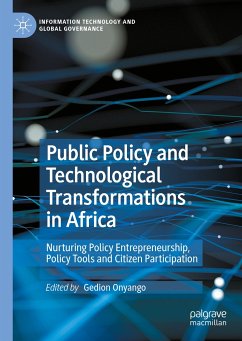In light of technologically driven revolutions that are already taking place in Africa, this book is an important source of policy insights. -Artwell Nhemachena, Research Fellow, University of South Africa, South Africa
Through empirically grounded analysis, authors provide an uncommon window into how African states are leveraging 4IR technologies. -E. Remi Aiyede, Professor, University of Ibadan, Nigeria
This book is highly recommended for anyone who wants to know what is at stake, what has recently been done in Africa, and how to proceed from here. -Nitesh Bharosa, Academic Director, Digicampus, the Netherlands
This book examines the links between public policy and Fourth Industrial Revolution (4IR) technological developments in Africa. It broadly assesses three key areas - policy entrepreneurship, policy tools and citizen participation - in order to better understand the interfaces between public policy and technological transformations in African countries. The book presents incisive case studies on topics including AI policies, mobile money, e-budgeting, digital economy, digital agriculture and digital ethical dilemmas in order to illuminate technological proliferation in African policy systems. Its analysis considers the broader contexts of African state politics and governance. It will appeal to students, instructors, researchers and practitioners interested in governance and digital transformations in developing countries.
Dieser Download kann aus rechtlichen Gründen nur mit Rechnungsadresse in A, B, BG, CY, CZ, D, DK, EW, E, FIN, F, GR, HR, H, IRL, I, LT, L, LR, M, NL, PL, P, R, S, SLO, SK ausgeliefert werden.









